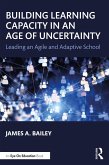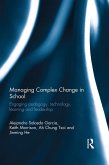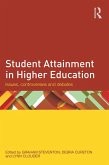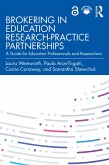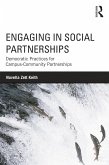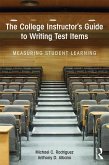Matthew T. Hora, Susan B. Millar
A Guide to Building Education Partnerships (eBook, ePUB)
Navigating Diverse Cultural Contexts to Turn Challenge into Promise
28,95 €
28,95 €
inkl. MwSt.
Sofort per Download lieferbar

14 °P sammeln
28,95 €
Als Download kaufen

28,95 €
inkl. MwSt.
Sofort per Download lieferbar

14 °P sammeln
Jetzt verschenken
Alle Infos zum eBook verschenken
28,95 €
inkl. MwSt.
Sofort per Download lieferbar
Alle Infos zum eBook verschenken

14 °P sammeln
Matthew T. Hora, Susan B. Millar
A Guide to Building Education Partnerships (eBook, ePUB)
Navigating Diverse Cultural Contexts to Turn Challenge into Promise
- Format: ePub
- Merkliste
- Auf die Merkliste
- Bewerten Bewerten
- Teilen
- Produkt teilen
- Produkterinnerung
- Produkterinnerung

Bitte loggen Sie sich zunächst in Ihr Kundenkonto ein oder registrieren Sie sich bei
bücher.de, um das eBook-Abo tolino select nutzen zu können.
Hier können Sie sich einloggen
Hier können Sie sich einloggen
Sie sind bereits eingeloggt. Klicken Sie auf 2. tolino select Abo, um fortzufahren.

Bitte loggen Sie sich zunächst in Ihr Kundenkonto ein oder registrieren Sie sich bei bücher.de, um das eBook-Abo tolino select nutzen zu können.
This book provides insights and guidance to enable prospective and existing education partners to develop answers to the questions that are critical to success: Why engage in this partnership? How can you communicate the potential benefits of partnership to motivate teachers, faculty, administrators, and community members?
- Geräte: eReader
- ohne Kopierschutz
- eBook Hilfe
- Größe: 0.71MB
Andere Kunden interessierten sich auch für
![Building Learning Capacity in an Age of Uncertainty (eBook, ePUB) Building Learning Capacity in an Age of Uncertainty (eBook, ePUB)]() James A. BaileyBuilding Learning Capacity in an Age of Uncertainty (eBook, ePUB)30,95 €
James A. BaileyBuilding Learning Capacity in an Age of Uncertainty (eBook, ePUB)30,95 €![Managing Complex Change in School (eBook, ePUB) Managing Complex Change in School (eBook, ePUB)]() Alejandro Salcedo GarciaManaging Complex Change in School (eBook, ePUB)29,95 €
Alejandro Salcedo GarciaManaging Complex Change in School (eBook, ePUB)29,95 €![Student Attainment in Higher Education (eBook, ePUB) Student Attainment in Higher Education (eBook, ePUB)]() Student Attainment in Higher Education (eBook, ePUB)41,95 €
Student Attainment in Higher Education (eBook, ePUB)41,95 €![Brokering in Education Research-Practice Partnerships (eBook, ePUB) Brokering in Education Research-Practice Partnerships (eBook, ePUB)]() Laura WentworthBrokering in Education Research-Practice Partnerships (eBook, ePUB)0,99 €
Laura WentworthBrokering in Education Research-Practice Partnerships (eBook, ePUB)0,99 €![Engaging in Social Partnerships (eBook, ePUB) Engaging in Social Partnerships (eBook, ePUB)]() Novella Zett KeithEngaging in Social Partnerships (eBook, ePUB)46,95 €
Novella Zett KeithEngaging in Social Partnerships (eBook, ePUB)46,95 €![The College Instructor's Guide to Writing Test Items (eBook, ePUB) The College Instructor's Guide to Writing Test Items (eBook, ePUB)]() Michael RodriguezThe College Instructor's Guide to Writing Test Items (eBook, ePUB)33,95 €
Michael RodriguezThe College Instructor's Guide to Writing Test Items (eBook, ePUB)33,95 €![Empirical Understanding of School Leaders' Ethical Judgements (eBook, ePUB) Empirical Understanding of School Leaders' Ethical Judgements (eBook, ePUB)]() Ori EyalEmpirical Understanding of School Leaders' Ethical Judgements (eBook, ePUB)36,95 €
Ori EyalEmpirical Understanding of School Leaders' Ethical Judgements (eBook, ePUB)36,95 €-
-
-
This book provides insights and guidance to enable prospective and existing education partners to develop answers to the questions that are critical to success: Why engage in this partnership? How can you communicate the potential benefits of partnership to motivate teachers, faculty, administrators, and community members?
Dieser Download kann aus rechtlichen Gründen nur mit Rechnungsadresse in A, B, BG, CY, CZ, D, DK, EW, E, FIN, F, GR, HR, H, IRL, I, LT, L, LR, M, NL, PL, P, R, S, SLO, SK ausgeliefert werden.
Produktdetails
- Produktdetails
- Verlag: Taylor & Francis
- Seitenzahl: 230
- Erscheinungstermin: 3. Juli 2023
- Englisch
- ISBN-13: 9781000979343
- Artikelnr.: 68356830
- Verlag: Taylor & Francis
- Seitenzahl: 230
- Erscheinungstermin: 3. Juli 2023
- Englisch
- ISBN-13: 9781000979343
- Artikelnr.: 68356830
- Herstellerkennzeichnung Die Herstellerinformationen sind derzeit nicht verfügbar.
Matthew T. Hora is an Associate Researcher at the Wisconsin Center for Educational Research, University of Wisconsin-Madison, where he is currently conducting research on the psychological, cultural and organizational factors influencing teaching in Institutions of Higher Education. Matthew received his Masters in Applied Anthropology from the University of Maryland, College Park after several years experience in organic agriculture and food systems research. He has spent the past seven years working in program evaluation, specializing in assessing the effects of pedagogical reforms in the science, technology, engineering, and mathematics (STEM) fields at the tertiary level.
Susan B. Millar , an anthropologist by training, is director of the education research challenge area of the Morgridge Institute for Research, and a senior scientist in the UW-Madison Wisconsin Center of Education Research. In her work with the Morgridge Institute for Research, she leads a team that is developing online interactive computer games and other learning resources designed to help youth and adults learn core science and engineering concepts in the biomedical disciplines.
Judith A. Ramaley is President of Winona State University. Prior to coming to Minnesota, Dr. Ramaley held a presidential professorship in biomedical sciences at the University of Maine and was a Fellow of the Margaret Chase Smith Center for Public Policy. She also completed a residency as a Visiting Senior Scientist at the National Academy of Sciences.From 2001 to 2004, Dr. Ramaley was Assistant Director, Education and Human Resources Directorate (EHR) at the National Science Foundation (NSF). Prior to joining NSF, Dr. Ramaley was president and professor of biology at the University of Vermont. Dr. Ramaley has a special interest in higher education reform and has played a significant role in designing regional alliances to promote educational cooperation. She has contributed to national discussions about the changing nature of work and the workforce. She plays a national role in the exploration of civic responsibility and the role of higher education in promoting good citizenship. She also has published extensively on educational reform; science, technology, engineering, and mathematics education; and the leadership of organizational change.
Susan B. Millar , an anthropologist by training, is director of the education research challenge area of the Morgridge Institute for Research, and a senior scientist in the UW-Madison Wisconsin Center of Education Research. In her work with the Morgridge Institute for Research, she leads a team that is developing online interactive computer games and other learning resources designed to help youth and adults learn core science and engineering concepts in the biomedical disciplines.
Judith A. Ramaley is President of Winona State University. Prior to coming to Minnesota, Dr. Ramaley held a presidential professorship in biomedical sciences at the University of Maine and was a Fellow of the Margaret Chase Smith Center for Public Policy. She also completed a residency as a Visiting Senior Scientist at the National Academy of Sciences.From 2001 to 2004, Dr. Ramaley was Assistant Director, Education and Human Resources Directorate (EHR) at the National Science Foundation (NSF). Prior to joining NSF, Dr. Ramaley was president and professor of biology at the University of Vermont. Dr. Ramaley has a special interest in higher education reform and has played a significant role in designing regional alliances to promote educational cooperation. She has contributed to national discussions about the changing nature of work and the workforce. She plays a national role in the exploration of civic responsibility and the role of higher education in promoting good citizenship. She also has published extensively on educational reform; science, technology, engineering, and mathematics education; and the leadership of organizational change.
Introduction. The Challenge and Promise of Education Partnerships The
Nature of Education Partnerships Working in a Partnership. New Tasks and
Challenges Methodology. Understanding the Underlying Mechanisms of
Partnership The Five Principles of Partnership How To Use This Book Part
One. Getting Ready for Partnership 1 Shall We Dance? Convening a
Pre-Partnership Planning Group Convening a Pre-Partnership Planning Group A
Final Word on Pre-Partnership Planning 2 Sizing Up Organizational
Aspirations and Attributes Problems, Goals, and Objectives Motivations
Capacity and Resources Autonomy and Interdependence 3 Understanding
Cultural Dynamics Avoiding the Common-Culture Myth Focusing On Cultural
Dynamics Within Organizations Agenda Items for Your Pre-Partnership Meeting
4 Crossing Organizational and Cultural Boundaries Why Boundary Crossing is
Important Characteristics of Boundary Crossing Agenda Items for Your
Pre-Partnership Planning Meeting Part Two. Designing A Partnership 5 Types
of Organizational Structures for Partnership Three Main Partnership
Structures Selecting a Partnership Type 6 Administration and Leadership
Governance Selecting Leaders Other Administrative Functions 7 Effective
communication systems Working With Existing Systems Creating a Progressive
Partnership Communication System Part Three Implementing Partnerships 8
Designing the work Understand the Task Environment Select Leverage Points
Build Bridges to All Levels of the Local Partner Organization 9 Developing
and Managing Working Groups Guidelines for All Working Groups Additional
Guidelines for Collaborative Working Groups 10 The Key Roles of Trust and
Managing Conflict Dynamics of Trust in Partnerships Strategies for
Developing Trust Managing Conflict in Education Partnerships Epilogue
Appendix A. Methodology References Glossary Index
Nature of Education Partnerships Working in a Partnership. New Tasks and
Challenges Methodology. Understanding the Underlying Mechanisms of
Partnership The Five Principles of Partnership How To Use This Book Part
One. Getting Ready for Partnership 1 Shall We Dance? Convening a
Pre-Partnership Planning Group Convening a Pre-Partnership Planning Group A
Final Word on Pre-Partnership Planning 2 Sizing Up Organizational
Aspirations and Attributes Problems, Goals, and Objectives Motivations
Capacity and Resources Autonomy and Interdependence 3 Understanding
Cultural Dynamics Avoiding the Common-Culture Myth Focusing On Cultural
Dynamics Within Organizations Agenda Items for Your Pre-Partnership Meeting
4 Crossing Organizational and Cultural Boundaries Why Boundary Crossing is
Important Characteristics of Boundary Crossing Agenda Items for Your
Pre-Partnership Planning Meeting Part Two. Designing A Partnership 5 Types
of Organizational Structures for Partnership Three Main Partnership
Structures Selecting a Partnership Type 6 Administration and Leadership
Governance Selecting Leaders Other Administrative Functions 7 Effective
communication systems Working With Existing Systems Creating a Progressive
Partnership Communication System Part Three Implementing Partnerships 8
Designing the work Understand the Task Environment Select Leverage Points
Build Bridges to All Levels of the Local Partner Organization 9 Developing
and Managing Working Groups Guidelines for All Working Groups Additional
Guidelines for Collaborative Working Groups 10 The Key Roles of Trust and
Managing Conflict Dynamics of Trust in Partnerships Strategies for
Developing Trust Managing Conflict in Education Partnerships Epilogue
Appendix A. Methodology References Glossary Index
Introduction. The Challenge and Promise of Education Partnerships The
Nature of Education Partnerships Working in a Partnership. New Tasks and
Challenges Methodology. Understanding the Underlying Mechanisms of
Partnership The Five Principles of Partnership How To Use This Book Part
One. Getting Ready for Partnership 1 Shall We Dance? Convening a
Pre-Partnership Planning Group Convening a Pre-Partnership Planning Group A
Final Word on Pre-Partnership Planning 2 Sizing Up Organizational
Aspirations and Attributes Problems, Goals, and Objectives Motivations
Capacity and Resources Autonomy and Interdependence 3 Understanding
Cultural Dynamics Avoiding the Common-Culture Myth Focusing On Cultural
Dynamics Within Organizations Agenda Items for Your Pre-Partnership Meeting
4 Crossing Organizational and Cultural Boundaries Why Boundary Crossing is
Important Characteristics of Boundary Crossing Agenda Items for Your
Pre-Partnership Planning Meeting Part Two. Designing A Partnership 5 Types
of Organizational Structures for Partnership Three Main Partnership
Structures Selecting a Partnership Type 6 Administration and Leadership
Governance Selecting Leaders Other Administrative Functions 7 Effective
communication systems Working With Existing Systems Creating a Progressive
Partnership Communication System Part Three Implementing Partnerships 8
Designing the work Understand the Task Environment Select Leverage Points
Build Bridges to All Levels of the Local Partner Organization 9 Developing
and Managing Working Groups Guidelines for All Working Groups Additional
Guidelines for Collaborative Working Groups 10 The Key Roles of Trust and
Managing Conflict Dynamics of Trust in Partnerships Strategies for
Developing Trust Managing Conflict in Education Partnerships Epilogue
Appendix A. Methodology References Glossary Index
Nature of Education Partnerships Working in a Partnership. New Tasks and
Challenges Methodology. Understanding the Underlying Mechanisms of
Partnership The Five Principles of Partnership How To Use This Book Part
One. Getting Ready for Partnership 1 Shall We Dance? Convening a
Pre-Partnership Planning Group Convening a Pre-Partnership Planning Group A
Final Word on Pre-Partnership Planning 2 Sizing Up Organizational
Aspirations and Attributes Problems, Goals, and Objectives Motivations
Capacity and Resources Autonomy and Interdependence 3 Understanding
Cultural Dynamics Avoiding the Common-Culture Myth Focusing On Cultural
Dynamics Within Organizations Agenda Items for Your Pre-Partnership Meeting
4 Crossing Organizational and Cultural Boundaries Why Boundary Crossing is
Important Characteristics of Boundary Crossing Agenda Items for Your
Pre-Partnership Planning Meeting Part Two. Designing A Partnership 5 Types
of Organizational Structures for Partnership Three Main Partnership
Structures Selecting a Partnership Type 6 Administration and Leadership
Governance Selecting Leaders Other Administrative Functions 7 Effective
communication systems Working With Existing Systems Creating a Progressive
Partnership Communication System Part Three Implementing Partnerships 8
Designing the work Understand the Task Environment Select Leverage Points
Build Bridges to All Levels of the Local Partner Organization 9 Developing
and Managing Working Groups Guidelines for All Working Groups Additional
Guidelines for Collaborative Working Groups 10 The Key Roles of Trust and
Managing Conflict Dynamics of Trust in Partnerships Strategies for
Developing Trust Managing Conflict in Education Partnerships Epilogue
Appendix A. Methodology References Glossary Index

